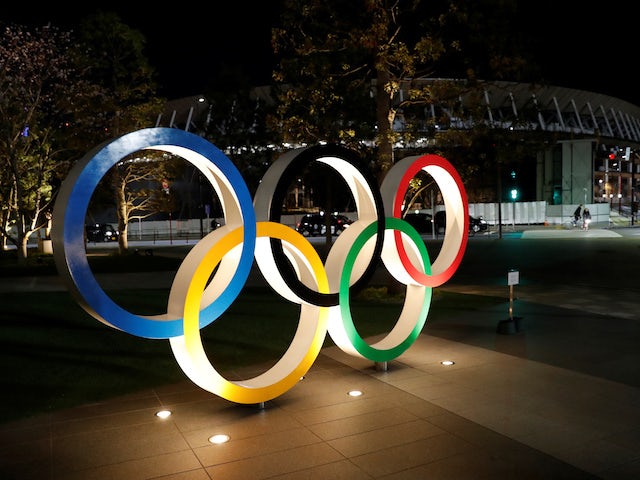Crowds at this summer’s Olympic Games in Tokyo have been capped at 50 per cent of a venue’s capacity, up to a maximum of 10,000.
Spectators will be asked to refrain from shouting or even talking loudly, and to travel directly to the venue and return home immediately afterwards. However, they are unlikely to be asked to prove they are negative for Covid-19, or fully vaccinated.
The president and chief executive of the Tokyo 2020 organising committee faced the media on Monday to provide details on the spectator plan, which comes after Japan’s top coronavirus adviser told them on Friday that the best way to limit the risk of infections was to hold the Games behind closed doors.
The limits set are in line with Japanese government criteria for other sports events in the country, but will not include individuals connected to Games sponsors or International Olympic Committee delegates, who will be classed as organisers and therefore not counted within the cap.
Children involved in a schools programme aimed at ensuring the younger generation experience the Games are also exempt from the cap, organisers said.
Tokyo 2020 chief executive Toshiro Muto was asked about media reports suggesting 20,000 people could ultimately attend the Games opening ceremony on July 23 including the exempted groups, but he said he expected the actual number would be below that.
A statement released by the organisers said capacity limits would be looked at again in the event of a new state of emergency being declared or other priority measures being imposed after July 12.

Tokyo 2020 organising committee president Seiko Hashimoto said via an interpreter: “We acknowledge that there is uncertainty around the pandemic so we need to be flexible.
“If there is any abrupt change in the situation, we will be holding a five-party meeting to make decisions.
“If there’s an announcement of a state of emergency, all options will be examined by the stakeholders.”
Muto said organisers had not decided “how to handle” Games officials and sponsors in the event of government calling for the Games to be behind closed doors.

In justifying the decision to exclude these dignitaries from capacity limits, Muto and Hashimoto pointed out they would be seated in an area away from general spectators and would be subject to the strict Covid protocols contained within the playbooks.
“This population is very controlled and we can manage the behaviour of these stakeholders,” Hashimoto said.
On the decision to keep the schools programme separate to the general spectator limits, Muto said: “We want the next generation to experience the excitement and emotion of the Games.
“People still talk about what they saw at the first Tokyo Olympics (in 1964), that’s how memorable this event is, and we wanted to offer the same experience to the younger children.”

Proof of a negative Covid test or full vaccination are unlikely to be required to gain entry.
“We are looking into many different perspectives but requiring spectators to bring proof of negativity would be problematic,” he said.
“At this point in time we are not expecting them to bring any such certificate.”
Details of ticketing arrangements following Monday’s decision will be outlined on Wednesday, organisers said.
A decision had been taken to bar overseas spectators in April.








